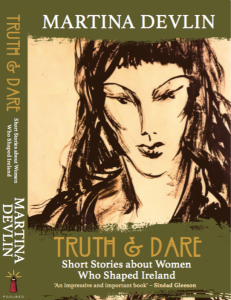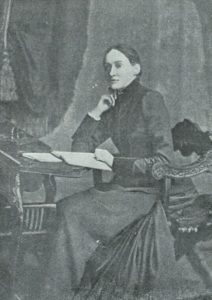Truth or Dare: Martina Devlin shares the introduction of her new book
 Leaders. Rebels. Pioneers. Short stories about some of Ireland’s trailblazing women by award-winning writer Martina Devlin.
Leaders. Rebels. Pioneers. Short stories about some of Ireland’s trailblazing women by award-winning writer Martina Devlin.
In this collection we encounter Countess Markievicz back from the dead to cast a disapproving eye over modern Ireland, Hanna Sheehy Skeffington on hunger strike in jail, and Somerville and Ross discussing book business with their London agent Mr Pinker.
Other we meet include a range of activists – Anna Parnell in a pawnshop, Belfast’s Mary Ann McCracken walking her brother to the scaffold, and Dr Kathleen Lynn locking horns with an archbishop.
Authentic and poignant, witty and revealing, Truth & Dare draws on true events to breathe life into an extraordinary cast of women.
Their times were out of step with them – now their time has come
INTRODUCTION
The stories which follow are about women, each of whom was true to her cause and dared to pursue it. Clever, steadfast and ambitious, they rejected the limitations of manmade rules designed for men’s benefit. Instead, they asked an incendiary question for the times they lived in: why shouldn’t we shape our own destiny?
They were trailblazers, these women – they left their footprints on Irish life. But while some are remembered, more are forgotten. Or if not quite forgotten, then reduced to two-dimensional historical figures.
For this collection, I set out to retrieve women who were submerged – overlooked, under-valued – and by placing them in context write them back into history. Each one pushed against boundaries and broke new ground. While they didn’t always succeed in their aims, they never shirked from decisive action. And they took it without asking anyone for permission first.
Opposition to their activities ranged from mockery to violence, while often they met with family disapproval in addition to the might of the law ranged against them. But they persevered. They supported one another. They found ways to circumvent obstacles. Above all, they believed whole-heartedly in something they knew they might not live long enough to see happen.
When I began thinking about them, wondering how to tell their stories, I had a choice to make. Should the collection take the form of fiction or biography? I decided on fiction because of the uncanny hold which stories have over us. Fiction is laced with enchantment. It hums with energy. It has the power to transport readers – to let us inhabit someone else’s life. Stories connect us with one another on a more intimate level than history or biography allow, creating space for magic to happen – the imaginative leap.
Consequently, while the women I write about here actually lived, certain events, conversations and a number of the characters they interact with are invented. That said, truth occasionally proved to be stranger than fiction, such as the central element of the Maud Gonne story. Some things you just couldn’t make up.
None of these stories represents the sum total of the woman concerned. After all, each of them led fascinating and productive lives, whereas a short story can do no more than filter light towards some element or other which caught my attention.
The women you are about to meet (or become reacquainted with) operated at a time when the notion of female autonomy was ridiculed by the majority of people, other women included. Why should a woman even care about earning her living when a husband, father or brother had a duty to look after her? Why would any decent woman seek to function outside the domestic sphere? Many people were mystified by the notion that self-respect and self-determination might be factors.
The women between these pages share some areas of kinship. They were Irish by birth, upbringing, or because they opted to make Ireland their focus. All mounted a challenge to the orthodoxy of traditional female roles. But their backgrounds, influences and political convictions were diverse. A number of them championed nationalism, others supported Ireland’s union with Britain. Some lobbied for the vote, others for a political function, education rights, or to be treated as men’s equal in the labour force.
A common denominator among the ones born into a comfortable lifestyle was their refusal to accept the restrictions of ornamental status. Women from poorer socio-economic backgrounds, by comparison, had no choice but to join the workplace, doing so with fewer opportunities and at lower pay rates than men. Some of the women who acted as persuaders for change were conscious of the need to speak out, not just in their own interests, but on behalf of their harder-pressed working sisters.
Mary Ann McCracken is where we begin. A social reformer, she figured among women who joined the anti-slavery movement, that campaign opening their eyes to their own lack of freedom. Later, centenary celebrations to mark the 1798 rebellion, many of them organised by women, were another catalyst.
And they were inspired by one another. These highly politicised women were conscious of their forerunners and read their writings – for example, members of the women’s suffrage movement were stirred by the vision, commitment and organisational skills of activists in the Ladies’ Land League.
A number of them straddle the labour, suffrage and nationalist movements, while others concentrated on one cause alone. Some decided they were feminists first and foremost. Others gave their principal loyalty to nationalism because it appeared to offer equality: if a new state was founded, they presumed the rulebook excluding women would be torn up. Post-independence, however, their male colleagues marched ahead and left them behind. The new Irish state proved to be conservative, paternalistic and controlling, as expressed by the 1937 Constitution which tried to contain women in the home.
What can be learned from the legacy of these pioneering women who became thinkers, writers, educators, lobbyists and politicians – when they could get elected, which didn’t happen often? That any group with power does not surrender it lightly. But by collaborating, being persistent and inventive, and having faith in their capacity to effect change, women could chip away at opposition to equality.
A century ago, a limited group of Irishwomen won the right to vote; four years later, in 1922, they finally had their due with the franchise on equal terms with men. Battles remained to be fought, however, and are outstanding still – a lot done, more to do.
As I worked on this collection, it struck me how many of the women were either single or widowed. That situation seemed to offer them a certain freedom. I also noticed the tendency for political activists to be marginalised, especially if they were radical progressives. Only after the stories were finished did I become conscious of how frequently spectral elements flitted through them, reflecting my sense that vibrant women were reduced to shadow figures during their lifetimes. Frozen out, their voices ignored, their achievements minimised – often, they ended up as living ghosts.
Don’t be deceived. These women were sticks of dynamite – the repercussions from their actions reverberate still. They are my heroes.
Martina Devlin, Dublin, Autumn 2018
 Martina Devlin is an author and journalist. Her latest book is Truth & Dare, a short story collection in which she brings to life some of the women who shaped Ireland – from Maud Gonne to Countess Markievicz to Hanna Sheehy Skeffington. Her novels include About Sisterland set in the future in a world ruled by women, The House Where It Happened about Ireland’s last witchcraft trial and Ship of Dreams about the Titanic disaster, with which she has a family connection.
Martina Devlin is an author and journalist. Her latest book is Truth & Dare, a short story collection in which she brings to life some of the women who shaped Ireland – from Maud Gonne to Countess Markievicz to Hanna Sheehy Skeffington. Her novels include About Sisterland set in the future in a world ruled by women, The House Where It Happened about Ireland’s last witchcraft trial and Ship of Dreams about the Titanic disaster, with which she has a family connection.
Her work has won a number of prizes including the Royal Society of Literature’s VS Pritchett Memorial Prize and a Hennessy Literary Prize, while she has been shortlisted three times for the Irish Book Awards. She writes a weekly current affairs column for the Irish Independent and has been named National Newspapers of Ireland commentator of the year. Vice-chair of the Irish Writers Centre, she is also a PhD candidate at Trinity College Dublin researching Somerville and Ross – who feature in Truth & Dare.
Have you an idea for a blogpost? Contact Dr Deirdre Flynn
Check out our blog post guidelines here.



